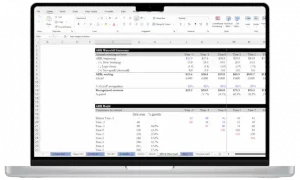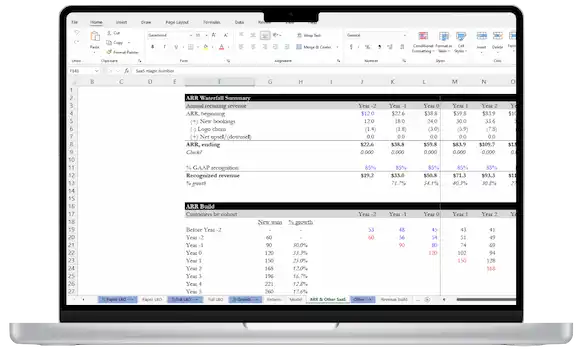Intro to case studies
The growth equity case study is the source of much anxiety for candidates preparing for interviews.
In general, case studies are often the difficult part of any private equity interview — even more so than why growth equity or other interview questions. But case studies can be especially challenging in growth equity given the wide range of case study types. In this article, I shed some light on this part of the interview and how best you can prepare.
One reason why this exercise can be more challenging than it is for private equity case studies is there are many different shapes it can take, and you don’t know which type you’ll get. That is, the exercise could focus on modeling expertise, investment judgement, or prospecting ability.
It can be difficult to know what to expect; however, most growth equity case studies fall into four different categories.
Growth equity modeling test
This usually takes place on-site. The firm will give you some source material on a company, which can range from a 10-k (if the company is public) to an internal investment committee memo (if the company is a portfolio company).
The exercise will usually last 1-3 hours; as such, to expedite things, you’ll usually be given a model template from which to build your model, however not always.
After completing the model, you may be asked to also leave time to create slides or draft a mini-investment memo. In this memo, you’ll be asked whether or not you support proceeding with the investment and why. (You knew I was going to say this, but of course, the “why” is most important).After time is completed, you’ll may be asked to present your work to investment professionals at the firm. Or, they will “grade” your work separately and get back to you on if you “passed.”
Keys to success in this type of case are:
- Technical growth equity modeling chops – is your model right? Does it include all the required features to properly analyze the growth company?
- Investment fundamentals – how do you think about growth investments? Does the way you’ve thought about the opportunity make sense and are you focused on the right areas?
- Ability to articulate or present your work – are your thoughts well-organized and do you articulate them succinctly and confidently? This is very important in growth equity as I believe firms place a premium on these skills in growth
- Time management – did you complete the entire exercise?
If these sound daunting, or you have questions about any of these areas, just remember these aren’t impossible skills to practice! In fact, I believe most, if not all, candidates can completely master these if they are truly dedicated and learn the right frameworks to apply.
In my full course, I cover in detail how to prepare for the growth equity modeling exercise (including the differences with typical LBO/buyout models), frameworks for analyzing growth investments, mental models for organizing and presenting your work, as well as time management rules for the case.
Prospecting exercise
This involves the firm asking you to investigate an industry (or an investment theme) and to prepare a short brief on companies in the space.
This is usually conducted as a take home assignment, where candidates can complete it on their own time but within a certain period.
I really love this kind of exercise, because it simulates one of the best parts of the growth equity job. That is, you join one of the top growth equity firms — so that you can be empowered to look into cool industries and pick the best companies!
Sure, you’ll also build models and investment committee memos on companies you’re pursuing (which is tested more directly in the modeling exercise), but I find what really sets investment professionals apart in growth equity are the skills tested in the prospecting exercise. In a future post, you’ll be able to read about how I majorly flopped my first “on the job” prospecting case study 🙂
This exercise should not be confused with what I call the “sourcing” mock interview, which is common for undergraduate hires. In sourcing interviews, you’re asked to simulate a cold call with prospective CEOs.
After you’ve submitted your work, you’ll usually be asked to discuss or present it in person or over the phone. This is where the firm will probe your thinking and make sure your investment judgement is sound.
Keys to success in this type of case are:
- Market analysis – How do you analyze markets? What are the competitive dynamics and what are the long-term growth fundamentals?
- Investment fundamentals – Same as above. How do you think about growth investments? Does the way you’ve thought about the opportunity make sense and are you focused on the right areas?
- Ability to articulate or present your work – Same as above. Are your thoughts well-organized and do you articulate them succinctly and confidently? This is a very important skill in growth equity as I believe firms place a premium on these skills in growth
In prospecting exercises, the investment fundamentals and the ability to present are under a microscope. However, you’ll note market analysis is also a key to success. This is slightly different than the modeling exercise, where market analysis can be important but is tested less explicitly.
Market analysis is critical in prospecting exercises because you’re not only assessing one company, but you’re making broad generalizations (and prioritizing) across multiple companies. That means, you need to step back and assess the market as a whole.
This can be tricky for candidates, especially those coming from investment banking where analysts typically focus on discrete transactions rather than pulling back and analyzing an industry. This is one of the areas, I believe management consultants can have a leg up in private equity recruiting.

- 88 lessons
- 18 video hours
- Excels & templates
Mini-case exercise
The mini-case is given to almost every interview candidate, in some form or another. It can happen at different points in the interview process, depending on the firm’s sequencing.
The mini-case involves a series of technical questions related to a single company or business problem. In my interviews with Advent International, I remember the mini-case was the most challenging aspect of the entire interview.
My interviewer started the mini-case by describing a portfolio company of theirs, the industry it operated in, and the broad strokes of an issue the company face. He explained the company was a distribution company that transported consumer packaged goods and was experiencing gross margin pressure.
Then, he asked a series of questions about what might be causing the company’s margin pressure, and ways I’d go about diagnosing the cause (hint: use data from the company’s balance sheet and P&L to diagnose unit cost, price, and volume trends then overlay industry analysis).
All told, this part of the interview will usually last 15 minutes or so. It can be prompted explicitly with a disclaimer like, “Now, we’ll spend a few minutes asking questions about a specific problem at a portfolio company which I’ll describe.” Or, the interviewer could start a mini-case less explicitly by sustaining a series of questions without the disclaimer upfront.
In any case, keys to success in this type of case are:
- Clarity of thought (under pressure) – this is the biggest thing the interview is probing; can you work through difficult problems on the fly? How does your brain think through problems?
- Ability to articulate ideas – it’s okay to think through problems out loud, but you want to make sure you’re able to summarize and synthesize your thinking where possible.
Mock sourcing call
Especially for analyst positions (post-undergrad), mock sourcing calls are common in growth equity interviews. I am planning to explore this unique portion of the interview in a separate post which I will link to here once complete.
**UPDATE: Here’s my completed break down of Sourcing and Mock Cold Call interview questions and case studies.
How important is the case study in growth equity interviews
Forget about interviews for a minute, and let’s think about what actually sets people apart as high performers in growth equity. At a highest level, the job is to find the highest growth markets, and then invest in the market leaders.
When you break this down, this means success is a function of the investor’s ability to pick the right market, to source the best companies within it, to pick the best company to pursue from all the companies you’ve sourced, and then to convince the company to take you on as a partner (aka “win” the deal).
All these core competencies map to the different skills tested in a case study. That’s why it is given lots of weight during the interview process.
Granted, it can seem a bit absurd to take one discrete portion of the interview process (that may only last 1 hour), and project forward the person’s career potential as an investor. However, this all the firm has to go on, so it’s an important piece of the puzzle.
Private equity interview case studies
Case studies also play an important part in getting into private equity. However, if I had to generalize, buyout firms are more focused on assessing the technical and modeling ability in junior/mid-level professionals, whereas growth equity may take a more holistic view of the candidate’s overall ability as an investor.
This is driven by the more varied nature of the growth equity job, which could include developing an industry thesis, sourcing attractive investment prospects, and then evaluating and executing on opportunities.
It’s more likely, at large firms especially, that a buyout analyst or associate’s typical day is more focused on the last part (evaluating and executing on opportunities), so modeling and the ability to churn through CIM’s are usually valued at a premium at these firms!
Send off!
Alright, team. That’s all I got for now! Check out my other posts on growth equity recruiting, and sign up for the newsletter below to receive all my best tips in your inbox. For more comprehensive interview prep, check out my full growth equity interview prep course.


 Break Into Growth Equity
Break Into Growth Equity
